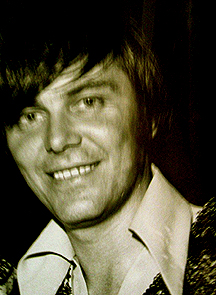Gary Kellgren facts for kids
Quick facts for kids
Gary Kellgren
|
|
|---|---|

Kellgren in 1969
|
|
| Background information | |
| Birth name | Gary Wayne Kellgren |
| Born | April 7, 1939 Shenandoah, Iowa |
| Died | July 20, 1977 (aged 38) Los Angeles, California, United States |
| Occupation(s) | Audio engineer |
| Years active | 1967–1977 |
Gary Kellgren (born April 7, 1939 – died July 20, 1977) was a talented American audio engineer. He helped start the famous The Record Plant recording studios with his business partner, Chris Stone. Gary was known for his amazing skills in the studio and for making recording places feel like home.
Contents
A Career in Music
Becoming a Sound Expert
Gary Kellgren was a very successful and respected audio engineer during the 1960s and 1970s. An audio engineer is like a sound architect. They use special equipment to record, mix, and master music. Gary also sometimes worked as a record producer, which means he helped artists create their songs.
He started his career at studios like Apostolic and Mayfair. He worked with famous musicians such as Jimi Hendrix, Frank Zappa, and Wes Farrell. Mayfair Studios in New York were considered the best. Gary was a master of the advanced eight-track recording system there.
Gary was also one of the first to use cool sound effects. He used "phasing", which makes a sound like a jet engine. He also helped create "flanging", another unique sound effect.
He worked with many legendary artists. These included John Lennon, Ringo Starr, George Harrison, Mick Jagger, Jimi Hendrix, Stevie Wonder, Carole King, and Barbra Streisand. He also collaborated with top producers like Phil Spector.
Gary was the mastermind behind the "Live at the Record Plant" recording sessions. He was chosen by George Harrison to record the historic Concert For Bangladesh. This concert was ranked as one of the greatest moments at Madison Square Garden. He also recorded the live concert for the famous "Rumble in the Jungle" boxing match in Zaire in 1974.
Designing Cool Studios
When Gary Kellgren started his career, recording studios were often plain. They had white walls and fluorescent lights. Engineers wore formal clothes, and musicians sat on folding chairs. There were not many comforts.
Gary had a big idea to change this. He wanted to make studios colorful and artistic. He wanted them to feel like a comfortable home or a fancy hotel. He also made sure they had the best technology.
His business partner, Chris Stone, once said that Gary was responsible for changing studios. He turned them from boring places into "living rooms". Gary believed a studio should be a comfortable place to record. He even built a Jacuzzi in one studio in 1969! This was a huge surprise and a new idea for studios.
Many musicians felt that the comfortable atmosphere Gary created helped them make better music. His studios were known for inspiring creativity.
The Record Plant Studios
In 1967, Gary Kellgren and Chris Stone opened their first Record Plant Recording Studio. It was in Manhattan, New York. Gary handled the creative and recording side. Chris managed the business. Their third partner, Ancky Johnson, provided the money.
Many top artists, like Jimi Hendrix, followed Gary to his new studio. The New York Record Plant was fully booked for months in advance right from the start.
The very first album recorded there was Electric Ladyland by Jimi Hendrix. Chris Stone shared that Gary and Jimi would sometimes work for days without stopping. About 90% of Electric Ladyland was made in Studio A with Gary and Jimi.

Almost two years later, Gary and Chris opened another Record Plant in Los Angeles. The first big project there was mixing the Woodstock soundtrack. It was also where John Lennon and Paul McCartney played music together in 1974.
In 1972, Record Plant Sausalito opened. Famous albums like Fleetwood Mac's Rumours were recorded there. Bob Marley and the Wailers also recorded Talkin' Blues live at this studio.
Later Life
Gary Kellgren passed away on July 20, 1977. He was survived by his wife Marta, their two children Devon and Mark, his sister Aleda, and his mother Crystal.
Music He Worked On
Albums
Gary Kellgren worked as an engineer or producer on many albums. Here are some of them:
- 1967: Chelsea Girl (Nico) – Engineer
- 1967: San Franciscan Nights (Eric Burdon & the Animals) – Engineer
- 1967: The Velvet Underground & Nico (The Velvet Underground) – Engineer, Mixing
- 1968: Electric Ladyland (Jimi Hendrix) – Engineer
- 1968: We're Only in It for the Money (The Mothers of Invention) – Engineer
- 1968: White Light/White Heat (The Velvet Underground) – Engineer
- 1970: Indianola Mississippi Seeds (B. B. King) – Engineer
- 1970: False Start (Love) – Engineer
- 1973: Coast to Coast: Overture and Beginners (Rod Stewart/Faces) – Engineer
- 1974: Second Helping (Lynyrd Skynyrd) – Engineer
- 1974: I've Got My Own Album to Do (Ron Wood) – Producer
- 1975: Two Sides of the Moon (Keith Moon) – Engineer
- 1975: Lazy Afternoon (Barbra Streisand) – Engineer
- 1976: Stone Alone (Bill Wyman) – Engineer
Recordings Released After His Death
Some of Gary's recordings were released years after he passed away:
- 1985: VU (The Velvet Underground) – Engineer (Recorded in 1969, released in 1985)
- 1991: Crosby, Stills & Nash (Box Set) (Crosby, Stills & Nash) – Engineer
- 1997: South Saturn Delta (Jimi Hendrix) – Engineer
- 2005: Concert for Bangladesh (Bonus Track) (George Harrison) – Engineer
- 2008: Electric Ladyland (40th Anniversary Collector's Edition) (Jimi Hendrix) – Engineer
Live Concerts Recorded
- 1971: Concert For Bangladesh – Engineer
- 1973: Coast to Coast: Overture and Beginners – Engineer
- 1974: Rumble in the Jungle – Engineer
 | Mary Eliza Mahoney |
 | Susie King Taylor |
 | Ida Gray |
 | Eliza Ann Grier |

